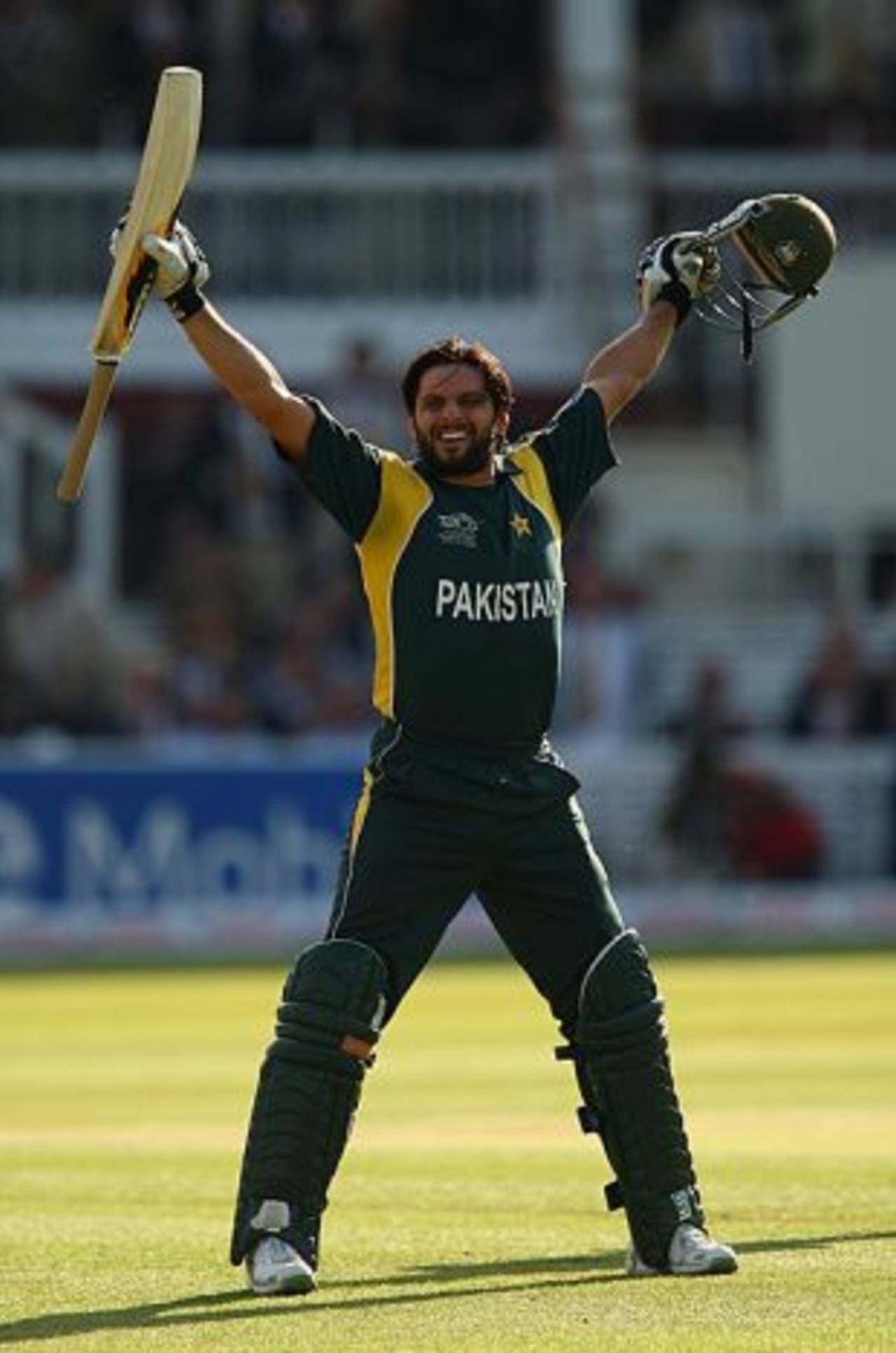Clinical, professional and un-Pakistani
The win came through a most uncharacteristic performance
Sambit Bal at Lord's
21-Jun-2009

Shahid Afridi's pose after sealing the win was that of a winner who had known the inevitability of victory • Getty Images
In the end there were no theatrics. The glory came with a leg-bye, and with Lasith Malinga appealing for a leg-before. Then there was Shahid Afridi, standing with arms wide open, pointing upwards. As the stadium erupted around him, he stood still, no drama; it was the pose of a winner who had known the inevitability of victory.
The team-mates came charging in; a flag was produced, some of the Pakistani players knelt to kiss the turf, and the stadium was awash with green. Suddenly you noticed that even the stewards were green and were called the green team. Was it always meant to be?
Resolute. Restrained. Mature. Measured. Not in the most bizarre of your dreams would you associate these words with Afridi. But those very words summed up his performance today. He wanted the responsibility, he grabbed it and fulfilled it. And his approach to the game was a microcosm of how Pakistani played the final.
It was a clinical, thought-out and utterly professional display. Very un-Pakistani. Yorkers didn't thud into pads or uproot stumps; there were no magic moments from the spinners, either; and the ball didn't fly over the ropes.
Abdul Razzaq, no more than a trundler, but a canny and grizzled one, did what the unheralded Angelo Mathews had done far more dramatically for Sri Lanka at The Oval a couple of days ago, and once Sri Lanka lost four wickets in the Powerplay, it was a question of keeping the screws tight. And so Pakistan did, until the last over, which produced 17 runs.
On another day, trusting a rookie bowler with the final over could have been a costly mistake, but this was to be Pakistan's day. And for the most part they remained in charge of the game. And from the way the first over was bowled, it was apparent there was a plan.
Tillakaratne Dilshan loomed large over the match. By a distance, he had been the batsman of the tournament, both prolific and quick, inventive and solid. Single-handed he had won Sri Lanka the semi-final, and with their bowling, Sri Lanka were perhaps not looking for a lot more than 150. The weakness of the Pakistan bowling attack, apparently, lay at the top. Would there be a change in tactics? Give Umar Gul an over? Open with Afridi?
Pakistan stuck to the same bowlers. Mohammad Aamer, 17 years and six Twenty20 matches old, was given the new ball. What changed, though, was the method. The first ball was a sharp bouncer, and Dilshan got hurriedly out of the way; the second one hurried him into a cut shot; the third pushed him further back, the fourth could have had him - the attempted pull ricocheted off his body and then caught his bat and could have gone anywhere; and the fifth did - a weak pull spooned up to backward square-leg. A plan only looks well-laid after it has been executed precisely.
Yorkers didn't thud in to the pads or uproot stumps; there were no magic moments from the spinners either; and the ball didn't fly over the ropes
The main threat removed, Pakistan fell back to the percentages. Razzaq removed three; Afridi hurried through his overs, subtly varying his pace - one ball was recorded at 126kph - and length, and mixing them up; Saeed Ajmal, slipped in overs quietly; and Gul arrived to finish the job. A lot has been said that about Gul's ability to reverse the 12-over-old ball, but his success at this format lies in his mastery over line and the ability mix up his length. It was a short ball that got him the wicket in this match.
The chase, of course, belonged to Afridi. He had scored three embarrassing ducks early in the tournament, mostly swiping across the line, and until the semi-finals had earned his spurs bowling. Ahead of the semi-final he had begged for a promotion, and vindicated himself there with a match-winning half century. Here in the final, though, he played perhaps the most responsible innings of his long and frustratingly inconsistent career. When Afridi nudges his third ball to midwicket and scampers two, you instantly become aware that you are watching something different. It turned out to be special.
His first boundary did not come until the 20th ball, when he hoisted Murali for a six and followed up an inside-out drive that went for four. There were seven boundary-less overs while he was at the crease, and in a sudden explosion, he turned the match irrevocably Pakistan's way hitting successive balls from Isuru Udana for six and four.
Like in the first tournament in South Africa, this one was a low-scoring final. It wasn't as dramatic, but it was a simmering, gritty contest won by a team desperate not to miss out once again. It would have had a poignant touch had Misbah-ul Haq, whose fateful scoop cost Pakistan the title the last time, got an opportunity to redeem himself, but that he was not needed reflected Pakistan's mastery over the proceedings.
As the Pakistan team took their victory lap, the public address system belted out "Dil Dil Pakistan", an all-time favourite rock song by Vital Signs, an 80s Pakistan band. Later at the press conference, Younis Khan described the win as a gift to the nation. The cricketers have done their bit to lift a beleaguered country.
Sambit Bal is the editor of Cricinfo